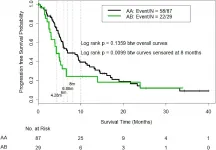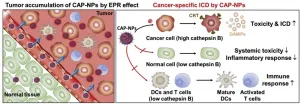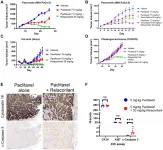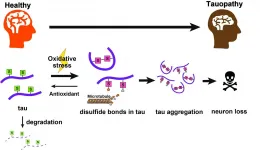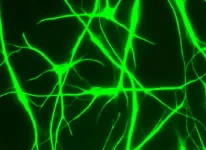(Press-News.org) Oncotarget published "Predicting clinical outcomes using cancer progression associated signatures" which reported somatic mutation signatures are an informative facet of cancer aetiology, however they are rarely useful for predicting patient outcome.
The aim of this study is to evaluate the utility of a panel of 142 mutation-signature–associated metrics for predicting cancer progression in patients from a ‘TCGA PanCancer Atlas’ cohort.
Cancer specific machine learning models were built using the output from the P142 panel to predict patient Progression Free Survival status as either “High PFS” or “Low PFS”.
Models accurately predicted PFS status for several cancer types, including adrenocortical carcinoma, glioma, mesothelioma, and sarcoma.
In conclusion, the P142 panel of metrics successfully predicted cancer progression status in patients with some, but not all cancer types analyzed.
The P142 panel of metrics successfully predicted cancer progression status in patients with some, but not all cancer types analyzed.
Dr. Mamrot from The GMDx Group Ltd as well as The Monash University said, "Cancer is a leading cause of human mortality worldwide and the incidence of cancer is expected to rise as our average life expectancy increases."
Furthermore, the accumulation of specific deaminase-associated mutations in a patient can provide valuable information on how the cancer has developed, and in specific cases provide information on the rate of progression of the disease and likely response to specific treatments.
Antecedent research has shown that, when combined with the codon-context of the targeted motifs for both cytosine and adenosine deaminases as described by Lindley, deaminase-associated mutation signatures can be used to stratify patients with high-grade serous ovarian cancer into long-term and short-term survivors.
This is the first application of these deaminase-associated metrics for predicting cancer progression and patient outcomes.
The aim of this study is to evaluate the efficacy of a panel of 142 deaminase-associated metrics for predicting the rate of cancer progression in patients selected from The Cancer Genome Atlas PanCancer Atlas cohort.
The P142 metrics evaluated in this study are defined and described in Supplementary Table
1. The authors hypothesize that the P142 markers associated with AID/APOBEC and ADAR deamination and codon reading frame context can be used to predict cancer progression for patients with a range of different cancer types.
The Mamrot Research Team concluded in their Oncotarget Research Output, "we have identified a correlation between cancer patient outcomes and changes in metrics associated with deaminase mutagenesis in some, but not all, cancer types investigated. Potential molecular explanations for this observation are based on our evolving understanding of dysregulated deaminase DNA mutagenesis, disrupted DNA-RNA repair pathways and subsequent aberrant protein production. Further investigation using prospective, purpose-designed studies would likely improve the efficacy of machine learning models and provide a more accurate evaluation of the potential utility of this approach. This study provides a basis for further development of biomarker panels based on metrics associated with deaminase mutagenesis for predicting cancer progression and patient outcome."
INFORMATION:
DOI - https://doi.org/10.18632/oncotarget.27934
Full text - https://www.oncotarget.com/article/27934/text/
Correspondence to - Jared Mamrot - jared.mamrot@gmdxgen.com
Keywords -
innate immunity,
biomarker,
mutagenesis,
oncogenesis,
cancer progression
About Oncotarget
Oncotarget is a bi-weekly, peer-reviewed, open access biomedical journal covering research on all aspects of oncology.
To learn more about Oncotarget, please visit https://www.oncotarget.com or connect with:
SoundCloud - https://soundcloud.com/oncotarget
Facebook - https://www.facebook.com/Oncotarget/
Twitter - https://twitter.com/oncotarget
LinkedIn - https://www.linkedin.com/company/oncotarget
Pinterest - https://www.pinterest.com/oncotarget/
Reddit - https://www.reddit.com/user/Oncotarget/
Oncotarget is published by Impact Journals, LLC please visit https://www.ImpactJournals.com or connect with @ImpactJrnls
Oncotarget published "Insulin-like growth factor 1/Child-Turcotte-Pugh composite score as a predictor of treatment outcomes in patients with advanced hepatocellular carcinoma treated with sorafenib" which reported that this study investigated the association of the IGF/CTP score with overall survival and progression-free survival of HCC patients treated with sorafenib.
The authors calculated the IGF/CTP score and used the Kaplan-Meier method and log-rank test to estimate and compare the time-to-event outcomes between patient subgroups.
171 patients were included, 116 of whom were CTP class A. Median ...
Unlike conventional cancer drugs that attack and kill cancer cells directly, anti-cancer immunotherapy, which kills cancer cells by strengthening the body's immunity, is a novel type of cancer treatment currently attracting increased attention. Unfortunately, a minority of cancer patients who have some degree of pre-existing immunity only benefit from anti-cancer immunotherapy.
Recently, 'doxorubicin', a cancer treatment drug, has been shown to boost patients' immune response by releasing various components when cancer cells are killed. However, as the toxicity and inflammatory responses induced by doxorubicin can affect normal cells in addition to cancer cells, it can lower ...
Oncotarget published "Glucocorticoid receptor antagonism promotes apoptosis in solid tumor cells" which reported that to guide studies in cancer patients, relacorilant, an investigational selective GR modulator that antagonizes cortisol activity, was assessed in various tumor types, with multiple cytotoxic combination partners, and in the presence of physiological cortisol concentrations.
In the MIA PaCa-2 cell line, paclitaxel-driven apoptosis was blunted by cortisol and restored by relacorilant.
A screen to identify optimal combination partners for relacorilant showed that microtubule-targeted agents consistently ...
PHILADELPHIA-- In addition to sickening and taking the lives of millions across the globe, COVID-19 complicated patient care in a range of less-direct ways, from increased incidence of END ...
HAMILTON, ON June 28, 2021 -- Researchers at McMaster University have developed a promising new cancer immunotherapy that uses cancer-killing cells genetically engineered outside the body to find and destroy malignant tumors.
The modified "natural killer" cells can differentiate between cancer cells and healthy cells that are often intermingled in and around tumors, destroying only the targeted cells.
The natural killer cells' ability to distinguish the target cells, even from healthy cells that bear similar markers, brings new promise to this branch of immunotherapy, say ...
A few males are enough to fertilise all the females. The number of males therefore has little bearing on a population's growth. However, they are important for purging bad mutations from the population. This is shown by a new Uppsala University study providing in-depth knowledge of the possible long-term genetic consequences of sexual selection. The results are published in the scientific journal Evolution Letters.
The study supports the theory that in many animal species selection acting on males can impose the fortuitous benefit to the population of causing offspring to inherit healthy genes. Stiff competition among males results ...
Tokyo, Japan - Researchers from Tokyo Metropolitan University have discovered that a specific chemical feature of a key protein known as tau may cause it to accumulate in the brain and trigger illnesses like Alzheimer's. They found that disulfide bonds on certain amino acids act to stabilize tau and cause it to accumulate, an effect that got worse with increased oxidative stress. The identification of chemical targets triggering tau accumulation may lead to breakthrough treatments.
The tau protein is key to the healthy function of biological cells. It helps form and stabilize microtubules, the thin filaments that crisscross cell interiors to help keep them structurally rigid and provide 'highways' to shuttle molecules between organelles. However, when they ...
A new vaccine to protect against deadly cholera has been made by grinding up genetically modified grains of rice. The first human trial has shown no obvious side effects and a good immune response. Researchers based at the University of Tokyo and Chiba University have published the peer-reviewed results of the Phase 1 clinical trial of the vaccine, named MucoRice-CTB, in The Lancet Microbe.
Vaccine manufacturing has made enormous strides in 2020, spurred on by COVID-19. However, the complexity of mRNA-based SARS-CoV-2 vaccines has highlighted the value of inoculations that can be made, transported and stored cheaply and without refrigeration.
The MucoRice-CTB vaccine is stable at room temperature from start to finish.
"I'm very optimistic for the future of our MucoRice-CTB vaccine, ...
Just as humans have their own individual personalities, new research in the Journal of Comparative Psychology shows that elephants have personalities, too. Moreover, an elephant's personality may play an important role in how well that elephant can solve novel problems.
The article was written by Lisa Barrett and Sarah Benson-Amram in the University of Wyoming's Animal Behavior and Cognition Lab, led by Benson-Amram. It may be viewed here.
The authors of the paper tested 15 Asian elephants and three African savanna elephants in three zoos across the country -- the San Diego Zoo, the Smithsonian's National Zoological Park and the Oklahoma City Zoo -- with the help of elephant caretakers.
Previous work from Barrett and Benson-Amram demonstrated ...
FINDINGS
A UCLA-led study comparing brain cells known as astrocytes in humans and mice found that mouse astrocytes are more resilient to oxidative stress, a damaging imbalance that is a mechanism behind many neurological disorders. A lack of oxygen triggers molecular repair mechanisms in these mouse astrocytes but not in human astrocytes. In contrast, inflammation activates immune-response genes in human astrocytes but not mouse astrocytes.
BACKGROUND
Although the mouse is a ubiquitous laboratory model used in research for neurological diseases, results from studies in mice are not always applicable to humans. In fact, more than 90% of drug candidates that show preclinical promise for neurological disorders ultimately fail when tested in humans, in part ...

